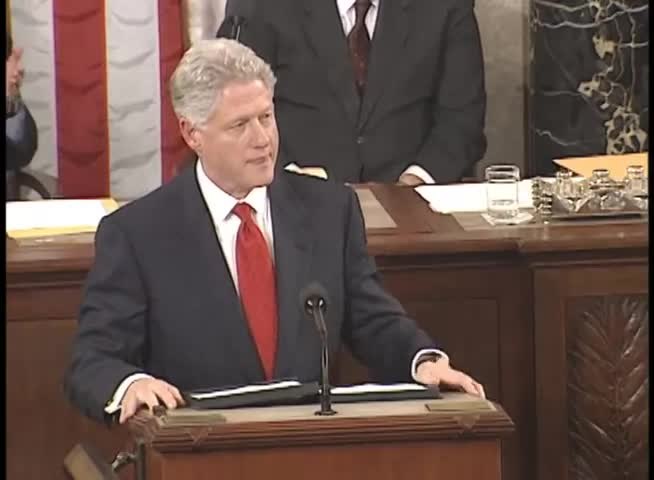In the annals of American political history, few speeches resonate with the weight and significance of President Bill Clinton’s 1996 State of the Union Address. Delivered on January 23rd, 1996, in the midst of his first term, Clinton’s speech marked a defining moment in the trajectory of the nation’s governance, encapsulated by his iconic declaration: “The era of big government is over. But we cannot go back to the time when our citizens were left to fend for themselves.”
This singular statement epitomized Clinton’s pragmatic approach to governance, encapsulating both the spirit of reform and the necessity of responsible, compassionate leadership. To understand the profound meaning of this address and its enduring impact on American politics, it is imperative to delve into the context, substance, and aftermath of this pivotal moment in history.
At the time of Clinton’s presidency, the United States found itself at a crossroads. Emerging from decades of Cold War tensions and economic instability, the nation sought a new path forward. Clinton, a moderate Democrat, embodied the hopes of a nation yearning for progress and renewal. His presidency promised a departure from the rigid ideologies of the past, advocating for a centrist agenda grounded in pragmatism and compromise.
The 1996 State of the Union Address served as a platform for Clinton to articulate his vision for America’s future. Central to his message was the recognition that the era of expansive government intervention, characterized by the New Deal and Great Society programs, had reached its limits. Clinton acknowledged the need for fiscal discipline and a reevaluation of the role of government in citizens’ lives. However, crucially, he emphasized that this shift did not signify a retreat from social responsibility or a return to laissez-faire policies of the past.
In declaring “The era of big government is over,” Clinton signaled a departure from traditional Democratic orthodoxy while simultaneously embracing the principles of moderation and pragmatism. His acknowledgment of the limitations of government intervention reflected a nuanced understanding of the evolving challenges facing the nation, including globalization, technological advancement, and demographic shifts.
Yet, Clinton’s statement was not a call for the abandonment of social welfare or public investment. Rather, it represented a recalibration of priorities and a commitment to effective, targeted governance. As he asserted, “But we cannot go back to the time when our citizens were left to fend for themselves,” Clinton underscored the enduring importance of a safety net and social protections for vulnerable Americans. This balanced approach sought to reconcile competing imperatives: fiscal responsibility and social equity.
The speech outlined a series of policy initiatives aimed at advancing this vision, including welfare reform, education reform, and deficit reduction measures. Clinton’s advocacy for welfare reform, embodied in the landmark Personal Responsibility and Work Opportunity Reconciliation Act of 1996, epitomized his commitment to fostering self-sufficiency while providing essential support for those in need. Similarly, his emphasis on education reflected a recognition of the transformative power of knowledge and human capital in an increasingly competitive global economy.
The impact of Clinton’s 1996 State of the Union Address reverberated far beyond the confines of Capitol Hill. It served as a catalyst for a broader reevaluation of American governance and political discourse. Clinton’s pragmatic centrism paved the way for a new era of bipartisan cooperation, as evidenced by his collaboration with Republican lawmakers on issues such as welfare reform and budgetary discipline.
Moreover, the speech laid the groundwork for the economic prosperity that characterized much of the late 1990s. By prioritizing fiscal discipline and targeted investment, Clinton helped usher in an era of sustained growth and low unemployment. His policies, including the 1993 Omnibus Budget Reconciliation Act and subsequent efforts to balance the federal budget, contributed to the longest peacetime economic expansion in American history.
However, Clinton’s presidency was not without controversy and challenges. The legacy of his tenure remains subject to debate, with critics pointing to scandals such as the Whitewater controversy and the impeachment proceedings stemming from his affair with Monica Lewinsky. Nevertheless, the enduring significance of his 1996 State of the Union Address lies in its embodiment of a pragmatic, forward-looking approach to governance that transcends partisan divides.
President Bill Clinton’s 1996 State of the Union Address stands as a seminal moment in American political history. His declaration that “The era of big government is over” encapsulated a shift in the nation’s governance paradigm, signaling a departure from the ideological battles of the past toward a more pragmatic, centrist approach. Yet, Clinton’s commitment to social responsibility and compassionate leadership ensured that this transition did not come at the expense of the most vulnerable members of society. The enduring impact of his vision and policies continues to shape the contours of American politics to this day, underscoring the enduring relevance of his presidency in an ever-changing world.
Watch the full speech below:
